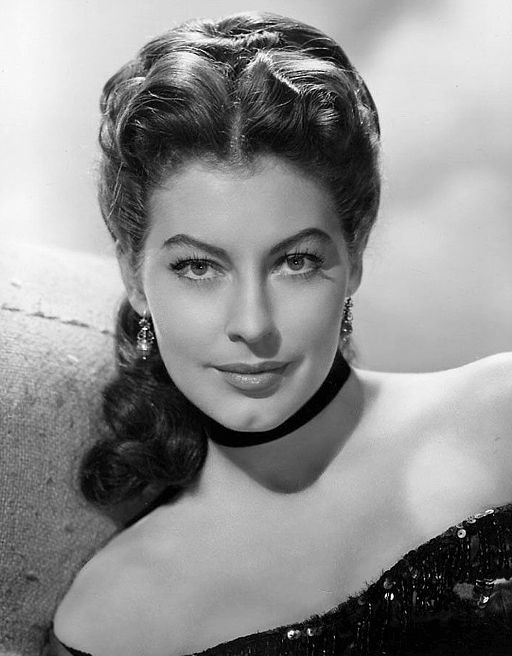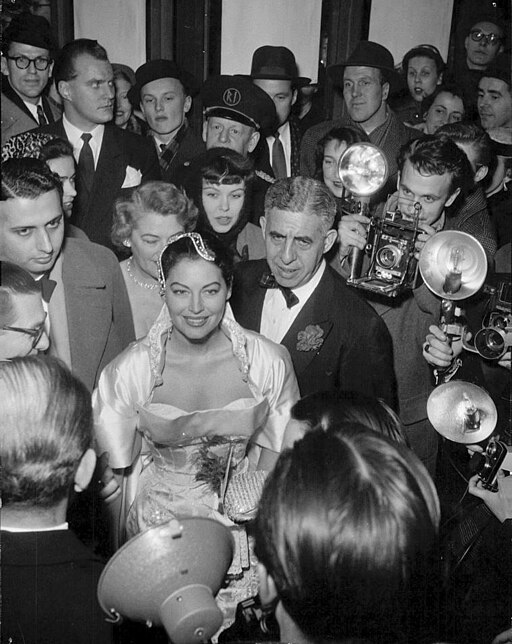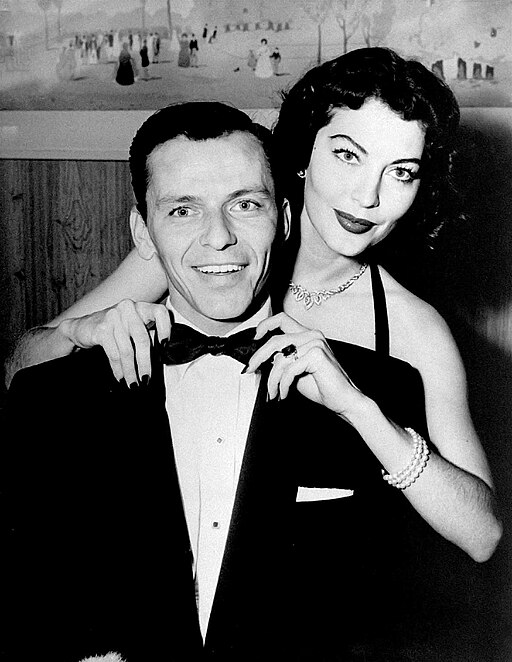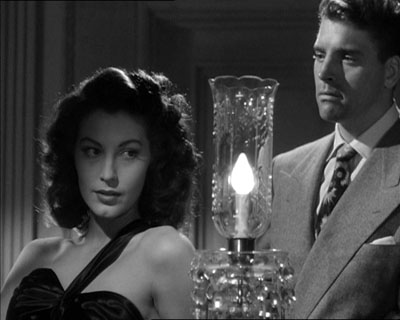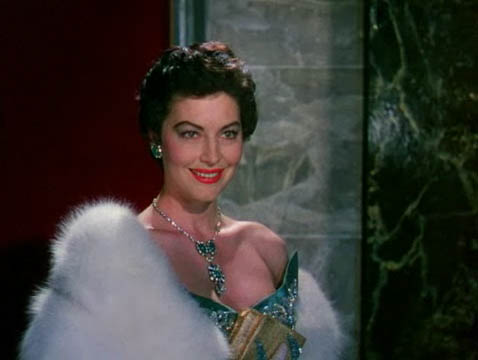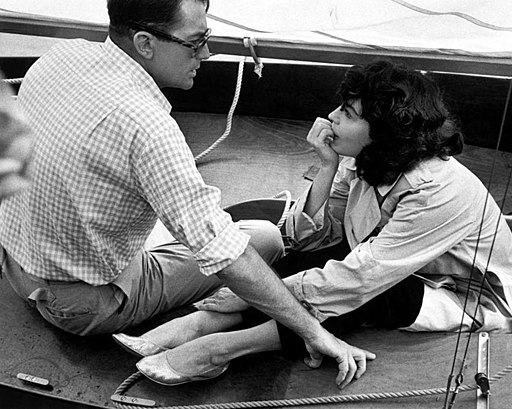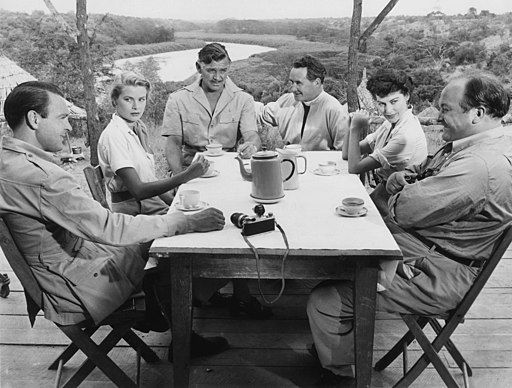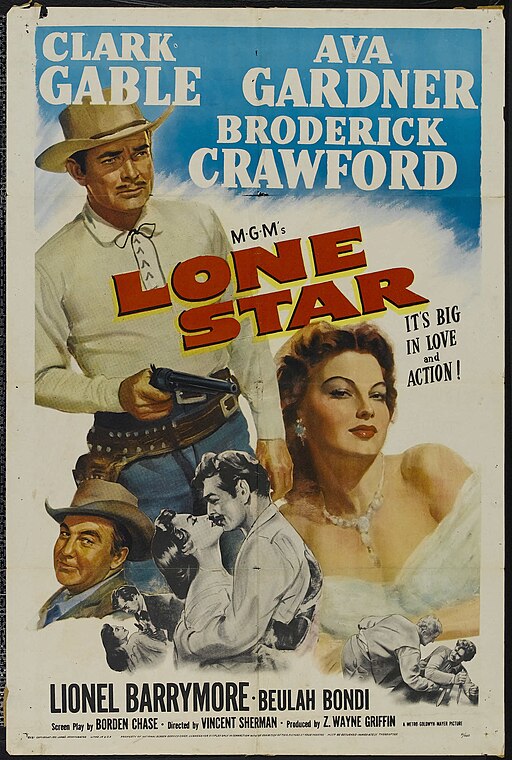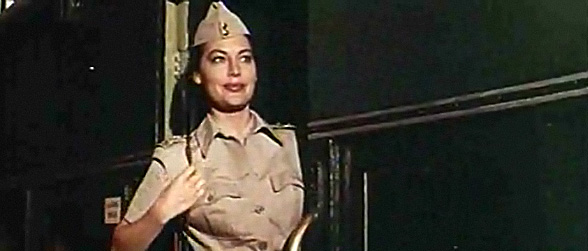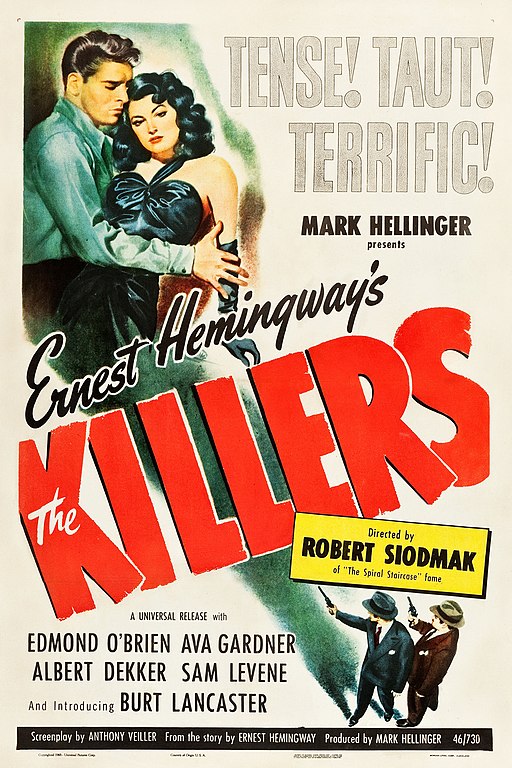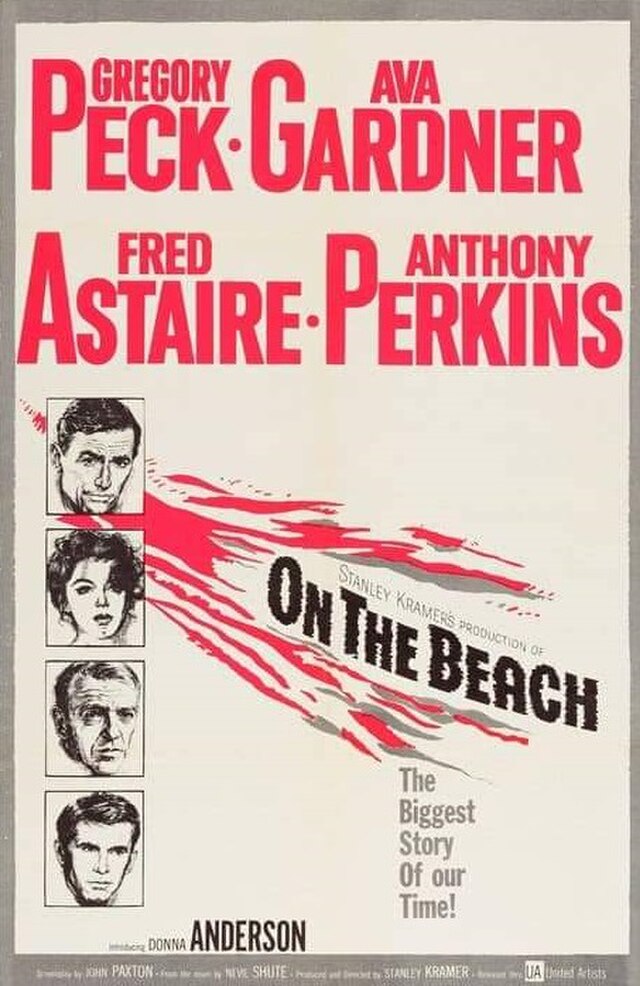Ava Gardner
back| Full Name | Ava Lavinia Gardner |
| Stage Name | Ava Gardner |
| Born | December 24, 1922 |
| Birthplace | Grabtown, North Carolina, USA |
| Died | January 25, 1990 |
| Buried | Sunset Memorial Park, Smithfield, North Carolina, USA |
| Married to | Mickey Rooney (1942–1943), Artie Shaw (1945–1946), Frank Sinatra (1951–1957) |
| Children | None |
| Notable films | The Killers (1946) - Mogambo (1953)- The Barefoot Contessa (1954)- On the Beach (1959) - The Night of the Iguana (1964) |
Ava Gardner
“The World’s Most Beautiful Animal” of Hollywood’s Golden Age
Ava Gardner, born on December 24, 1922, in Grabtown, North Carolina, blossomed into a major Hollywood star in the 1940s and 1950s, renowned for her striking beauty and captivating screen presence.
Discovered by MGM, her breakthrough came with "The Killers" in 1946, establishing her as a leading lady. Notable roles in "Mogambo," for which she received an Academy Award nomination, "The Barefoot Contessa," and "On the Beach" cemented her acting credentials.
Her off-screen life was just as newsworthy, marked by high-profile marriages to Mickey Rooney, Artie Shaw, and Frank Sinatra. Gardner's later years saw her acting in fewer films but still delivering strong performances in works like "The Life and Times of Judge Roy Bean" and "Earthquake."
She spent her final years living quietly in London, passing away on January 25, 1990, at age 67, leaving behind a legacy of classic cinematic moments and a life that mirrored the intensity and passion of the characters she portrayed on screen.
Ava Gardner was often referred to as "The World's Most Beautiful Animal," a nickname attributed to her by the publicity department at MGM, the studio under which she was contracted. Ava Gardner's legacy is that of a woman who broke hearts and defied expectations, leaving an indelible mark on Hollywood's Golden Age.
Related
Ava Gardner
Biography, analysis of her career and all her movies
Ava Lavinia Gardner was born on December 24, 1922, in the small farming community of Grabtown, North Carolina. The youngest of seven children, Gardner’s life took a turn towards the extraordinary when her photograph was spotted by a talent scout, leading her to sign a contract with Metro-Goldwyn-Mayer in 1941.
Gardner's early years in Hollywood were marked by bit parts and an undemanding schedule, but her breakthrough came with "The Killers" (1946), a film noir based on a Hemingway short story, where she played the sultry femme fatale opposite Burt Lancaster. Her alluring performance established her as a genuine star.
Her subsequent work throughout the 1950s solidified her status as one of Tinseltown's most talented and stunning actresses. Her performance in "Mogambo" (1953) earned her an Academy Award nomination for Best Actress, and she followed that success with a memorable role in "The Barefoot Contessa" (1954), portraying a dancer turned movie star, mirroring her own rise to fame.
Gardner's on-screen presence was magnetic, characterized by a mix of sensuality and strength. She worked with some of the most prominent directors of her time, including John Ford, George Cukor, and John Huston, and starred alongside Hollywood’s leading men such as Clark Gable, Humphrey Bogart, and Richard Burton.
Off-screen, Gardner's life was equally headline-worthy. Her marriages, especially to Frank Sinatra, with whom she shared a passionate but stormy relationship, were the subject of intense media scrutiny. Gardner was known for her free spirit and resistance to the studio system's control, making her one of the more formidable personalities of her era.
Despite her glamorous image, Gardner was known to be unpretentious and skeptical of Hollywood’s glitz. She spent her later years living more privately, residing in Spain and London, and taking roles that interested her rather than those that promised continued stardom.
Relation with Howard Hughes:
Ava Gardner's relationship with the business magnate and film producer Howard Hughes was one of the most talked-about aspects of her private life. The two began their tumultuous affair in the mid-1940s, during a time when Hughes was known for dating many famous actresses.
Hughes was captivated by Gardner's beauty and charisma, and their relationship was intense and often volatile. Gardner was known for her fiery temperament and was not easily controlled, which was something that Hughes, known for his attempts to manage the lives of the women he was involved with, found challenging. Their on-and-off relationship was fraught with jealousy and arguments, partly due to Hughes's possessive nature and Gardner's independent streak.
Despite the difficulties, their relationship lasted on and off for several years. Hughes is said to have proposed to Gardner multiple times, but she never accepted. The two shared a strong connection, and Hughes continued to hold a torch for Gardner for many years after their romantic relationship ended.
Hughes's influence was also significant in Gardner's early career. He helped her get noticed in Hollywood, although her talent and screen presence were the real reasons she became a star. Their relationship was one of the many high-profile romances Gardner had throughout her life, which included marriages to Mickey Rooney, Artie Shaw, and Frank Sinatra.
Marriage with Frank Sinatra:
Ava Gardner's marriage to Frank Sinatra is one of the most storied romances in Hollywood history. They were married from 1951 to 1957, but their connection lasted a lifetime.
Their relationship began when both were at significant points in their careers: Sinatra's was waning, while Gardner's was on the ascent. Sinatra was still married to his first wife, Nancy, when he and Gardner began their affair, which caused a scandal. They married after Sinatra's divorce was finalized.
The marriage was famously tempestuous, marked by passionate love and equally passionate arguments. They were both headstrong and possessed fiery temperaments, which made for a volatile combination. Sinatra adored Gardner, and she had a profound impact on his life and career. It was during a low point in Sinatra's career that Gardner encouraged him and even financially supported him at times. His career resurgence, marked by an Academy Award for his role in "From Here to Eternity," is often credited in part to Gardner's influence and support.
However, their marriage was strained by jealousy, infidelities, and the pressures of their respective careers. Gardner's filming schedule often took her overseas, while Sinatra's performances kept him touring extensively. Despite their separations and the conflicts, the emotional bond between them remained strong.
Even after their divorce in 1957, they continued to see each other on and off for several years. Their connection endured through the remainder of Gardner's life, with Sinatra reportedly rushing to her side when she suffered a stroke in 1989. Gardner passed away in 1990, and Sinatra was deeply affected by her death.
Ava Gardner once described Frank Sinatra as the love of her life, and he expressed similar sentiments about her. Despite the many difficulties, their love story remains one of the most enduring in the annals of Hollywood romance.
Cause of Death:
Ava Gardner passed away on January 25, 1990, at the age of 67. She suffered from pneumonia, but her health had been declining for several years before her death due to other ailments as well. She had previously suffered two strokes in 1986, which left her partially paralyzed and bedridden. Despite her health challenges, she continued to remain as active as possible until her death. Her smoking habit also contributed to her poor health over the years.
She was buried in her native North Carolina, far from the Hollywood glitz, but forever etched in its history.
Gardner’s legacy endures through her films, which continue to captivate audiences with the depth and dynamism she brought to her roles. Her life, marked by both luminous screen appearances and personal challenges, remains a testament to her enduring appeal and complexity as both a star and a person.
Analysis of Ava Gardner’s acting style:
Ava Gardner was known for her smoldering on-screen presence, marked by a distinctive blend of sultry allure and a forthright, sometimes fiery personality. Here's an analysis of her acting style and screen persona:
Naturalism
Ava Gardner's performances were often noted for their naturalistic quality. She possessed an innate ability to embody her characters with a sense of authenticity and ease. Her acting didn't appear forced; she seemed to live the role rather than perform it, which made her characters resonate with audiences.
Sensuality
Gardner's sensuality was one of her most defining attributes. She could convey desire and allure with subtlety—a glance, a tilt of the head, a casual movement. This understated eroticism was central to her performances, particularly in roles that capitalized on her status as a sex symbol.
Strength and Vulnerability
Despite her often glamorous and tough exterior, Gardner's performances often revealed a vulnerability that added layers to her characters. In films like "The Barefoot Contessa," her character was not just a symbol of beauty and desire but also a woman with aspirations, pains, and disappointments.
Voice and Accent
Gardner's voice was distinctive—a low, husky tone that could convey both tenderness and tenacity. Although she was a Southern belle, her accent was not typically pronounced, allowing her to play various roles that were not region-specific.
Emotional Intensity
When the role demanded it, Gardner could unleash powerful emotions. Her performances were charged with an intensity that could swing from passionate love to anger or despair, often providing the emotional core of her films.
Adaptability
Throughout her career, Gardner showed an admirable range, adapting to different genres and roles—from the fiery and independent woman in "Mogambo" to the tragic, alcohol-damaged singer in "The Night of the Iguana." Her ability to diversify her performances kept her career dynamic and interesting.
Screen Chemistry
Gardner had an incredible chemistry with her co-stars, which contributed to her memorable performances. Whether paired with the brooding intensity of Richard Burton or the smooth charm of Frank Sinatra, she held her own and often elevated the performances of her screen partners.
Ava Gardner didn't receive formal training typical of many actors of her time, and she often downplayed her abilities, seeing herself as less of an actress and more as a star who wore her fame reluctantly. However, her natural talent, combined with her distinctive beauty and charismatic screen presence, ensured her a place among the pantheon of Hollywood legends. Her acting style remains emblematic of the Golden Age of Hollywood, where the blend of glamour and emotional depth created cinematic icons.
Documentary about Ava Gardner
In the following YouTube video you can view a great documentary about Ava Gardner:
Most notable movies featuring Ava Gardner:
1940s:
"The Killers" (1946): Gardner gained recognition in this film noir as Kitty Collins, the sultry girlfriend of an ex-boxer who is involved in criminal activities.
"The Hucksters" (1947): She plays the love interest in this drama about post-war American business and advertising.
1950s:
"Pandora and the Flying Dutchman" (1951): A fantasy-romance film where Gardner's character falls in love with a mysterious man who is doomed to sail the seas for eternity.
"Show Boat" (1951): She stars as Julie, a woman of mixed race who faces prejudice in this musical based on the Broadway show.
"Mogambo" (1953): Gardner received an Academy Award nomination for her role as Eloise Kelly, an outspoken woman involved in a love triangle during a safari in Africa.
"The Barefoot Contessa" (1954): This drama, one of her most famous films, had Gardner as Maria Vargas, a Spanish dancer who becomes a Hollywood star, facing tragedy and disillusionment.
"Bhowani Junction" (1956): She portrays an Anglo-Indian woman in colonial India, struggling with her identity and torn between two men.
1960s:
"On the Beach" (1959): Gardner plays a woman living in post-apocalyptic Australia, awaiting the inevitable end after a nuclear war.
"The Night of the Iguana" (1964): A drama where she plays Maxine Faulk, the earthy and quick-witted proprietress of a rundown hotel, interacting with troubled characters in a Mexican coastal town.
1970s:
"Earthquake" (1974): An ensemble disaster film where Gardner plays Remy, the estranged wife of a successful engineer, as they face a devastating earthquake in Los Angeles.
1980s:
"The Blue Bird" (1976): In this fantasy film, Gardner plays Luxury, one of the embodiments of happiness searched for by two children.
"Priest of Love" (1981): A biographical film about D.H. Lawrence, with Gardner as Mabel Dodge Luhan, a wealthy patron of the arts.
Awards and nominations for Ava Gardner:
Ava Gardner was not extensively recognized by the major awards ceremonies during her lifetime. She was known more for her alluring screen presence and her performances in some of the classic films of Hollywood's Golden Age. However, she did receive a few notable nominations:
Academy Awards (Oscars):
- Nominated for Best Actress in a Leading Role for "Mogambo" (1953)
BAFTA Awards:
- Nominated for Best Foreign Actress for "Mogambo" (1953)
- Nominated for Best Foreign Actress for "Bhowani Junction" (1956)
Golden Globe Awards:
- Nominated for Best Actress in a Motion Picture – Drama for "Mogambo" (1953)
Although these are the major award nominations she received, Gardner's contribution to film has been more broadly recognized in the years following her death. Her performances have been retrospectively celebrated, and she has been listed among the greatest female stars of classical Hollywood cinema by the American Film Institute.
Remarkable quotes from Ava Gardner:
On Love and Life:
"Love is a word that is constantly heard, Hate is a word that is not. Love, I am told, is more precious than gold. Love, I have read, is hot. But hate is the verb that to me is superb, and Love but a drug on the mart. Any kiddie in school can love like a fool, but Hating, my boy, is an Art."
On Her Image:
"I think the main reason my marriages failed is that I always loved too well but never wisely."
On Hollywood:
"What's the point? My face, shall we say, looks lived in."
On Her Career:
"I haven't taken acting seriously and had to learn that acting is not just a pastime but an art."
On Herself:
"Deep down, I'm pretty superficial."
Reflecting on Life Choices:
"I either write the books or sell the jewels, and I'm kinda sentimental about the jewels."
On Independence:
"I wish to live until 150 years old, but the day I die, I wish it to be with a cigarette in one hand and a glass of whiskey in the other."
Analysis of Ava Gardner’s performance in the movie “Mogambo”:
Ava Gardner's performance in "Mogambo" (1953) is widely regarded as one of her most vibrant and captivating roles. Directed by John Ford, the film is a Technicolor adventure/romantic drama set in the African wilderness.
Gardner plays Honey Bear Kelly, a vivacious and sultry showgirl who becomes entangled in a love triangle with Victor Marswell (played by Clark Gable), a big-game hunter, and Linda Nordley (played by Grace Kelly), the prim and proper wife of an anthropologist.
Here's an analysis of her performance in "Mogambo":
Complex Characterization:
Gardner’s character, Honey Bear Kelly, is written as a woman with a tough exterior, but Gardner imbues her with a sense of vulnerability and warmth. This nuanced portrayal makes her both alluring and sympathetic.
Chemistry with Co-Stars:
Her chemistry with Gable is palpable and harks back to the kind of on-screen chemistry reminiscent of classic Hollywood. Their dynamic balances between flirtatious sparring and moments of genuine emotional connection.
Comedic and Dramatic Balance:
Gardner displays a deft balance between comedy and drama. She delivers lines with a wit and timing that provide comic relief, yet she's equally adept in the more dramatic moments, conveying a depth of emotion.
Physicality:
The role required a physicality that Gardner embraced wholeheartedly, whether it was handling the rough conditions of shooting on location in Africa or interacting with the animals that were part of the film's backdrop.
On-Screen Evolution:
Throughout the film, Gardner’s character undergoes a transformation. She effectively portrays Honey Bear's emotional journey from a carefree and self-interested individual to one who is capable of deep love and self-sacrifice.
Sexual Boldness:
For the era, Gardner's role was quite forward in its sexual confidence. She managed to convey a sensuality that was overt yet tasteful, embodying the liberated spirit that was often attributed to her off-screen persona as well.
Critical Acclaim:
Gardner’s work in "Mogambo" earned her a nomination for the Academy Award for Best Actress. Her ability to hold her own opposite two huge stars of the time, Gable and Kelly, further attests to her strong performance.
In "Mogambo," Ava Gardner's talent for portraying complex, multifaceted women shines through, making Honey Bear Kelly one of her most memorable characters. It’s a performance that capitalized on her ability to be at once seductive, strong, and endearing, capturing the hearts of the audience and critics alike.
Analyzing Ava Gardner’s role as Moira Davidson in “On The Beach”:
In the 1959 film "On the Beach," Ava Gardner plays Moira Davidson, one of the central characters in this post-apocalyptic drama directed by Stanley Kramer. The film is set in a world ravaged by nuclear war, where the residents of Australia await the arrival of deadly radiation that has wiped out the rest of humanity.
Here's an analysis of her performance in "On the Beach":
Emotional Depth:
Gardner's portrayal of Moira Davidson is one imbued with layers of sadness, resignation, and occasionally, sparks of hope. She brings an emotional depth to her character that resonates with the film's somber theme of impending doom.
Complex Relationship Dynamics:
Her character develops a complicated relationship with the American submarine officer, Commander Dwight Towers, played by Gregory Peck. Moira falls in love with Dwight, who remains loyal to the memory of his deceased family in the United States. Gardner deftly captures the nuances of a woman who is deeply in love but faced with an unattainable partner.
Transformation and Growth:
Throughout the film, Gardner’s Moira exhibits a significant transformation. Initially presented as a free-spirited, somewhat disillusioned individual who turns to alcohol to numb the pain of her doomed existence, she evolves into someone who finds strength and purpose in the face of the inevitable, largely influenced by her relationship with Dwight.
Subtlety in Performance:
Gardner delivers a restrained performance, marked by moments of subtlety that speak volumes. Her interactions with Peck's character are filled with unspoken words and emotional undercurrents, showcasing her ability to communicate through silence and expression.
Symbolic Representation:
Moira symbolizes the humanity that remains in a collapsing world – her struggles, affections, and fears reflect the broader human experience when confronted with the end of existence. Gardner's performance makes Moira a relatable and tragic figure, encapsulating the essence of human vulnerability.
On-Screen Presence:
Even in a role that is less glamorous than many others in her career, Gardner's screen presence remains commanding. She brings a dignified grace to Moira, a quality that aligns well with the film's introspective and melancholic tone.
Critics’ Reception:
Gardner received praise for her performance in "On The Beach," with critics noting the poignancy and authenticity she brought to the role. It stands as one of her more critically acclaimed performances, although it did not garner her any major award nominations.
In "On The Beach," Ava Gardner's performance is key to the film's emotional impact. She portrays Moira Davidson as a deeply human character, navigating the despair of a world on the brink of extinction with a sense of personal strength and compassion. It's a role that showcases Gardner's range and reinforces her status as a talented actress capable of tackling complex, dramatic roles.
Full list of movies with Ava Gardner:
- 1941: "Shadow of the Thin Man"
- 1941: "H.M. Pulham, Esq."
- 1942: "This Time for Keeps"
- 1942: "Kid Glove Killer"
- 1942: "Calling Dr. Gillespie"
- 1942: "Mighty Lak a Goat"
- 1942: "We Were Dancing"
- 1942: "Sunday Punch"
- 1943: "Hitler's Madman"
- 1943: "Ghosts on the Loose"
- 1943: "Young Ideas"
- 1943: "Du Barry Was a Lady"
- 1944: "Two Girls and a Sailor"
- 1944: "Three Men in White"
- 1944: "Maisie Goes to Reno"
- 1944: "Blonde Fever"
- 1945: "She Went to the Races"
- 1946: "The Killers"
- 1947: "Singapore"
- 1947: "The Hucksters"
- 1948: "One Touch of Venus"
- 1949: "The Bribe"
- 1949: "The Great Sinner"
- 1949: "East Side, West Side"
- 1951: "Pandora and the Flying Dutchman"
- 1951: "Show Boat"
- 1952: "Lone Star"
- 1952: "The Snows of Kilimanjaro"
- 1953: "Mogambo"
- 1953: "Ride, Vaquero!"
- 1953: "Knights of the Round Table"
- 1954: "The Barefoot Contessa"
- 1956: "Bhowani Junction"
- 1957: "The Little Hut"
- 1957: "The Sun Also Rises"
- 1958: "The Naked Maja"
- 1959: "On the Beach"
- 1960: "The Angel Wore Red"
- 1963: "55 Days at Peking"
- 1964: "The Night of the Iguana"
- 1966: "The Bible: In the Beginning..."
- 1967: "The Comedians"
- 1968: "Mayerling"
- 1970: "The Ballad of Tam Lin"
- 1972: "The Life and Times of Judge Roy Bean"
- 1974: "Earthquake"
- 1976: "The Blue Bird"
- 1977: "The Cassandra Crossing"
- 1979: "City on Fire"
- 1980: "The Kidnapping of the President"
- 1981: "Priest of Love"
- 1982: "Regina Roma"
- 1985: "A.D."
- 1986: "Maggie"

